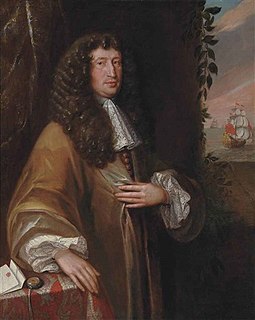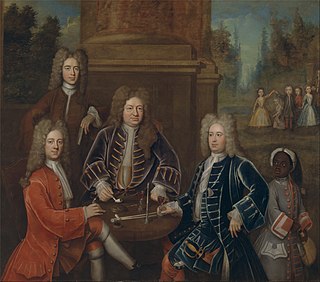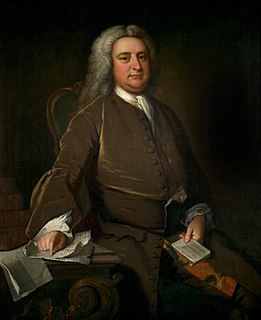Related Research Articles

John Barrington, 1st Viscount Barrington, known as John Shute until 1710, was an English dissenting theologian and Whig politician who sat in the House of Commons from 1715 to 1723.

Lord James Cavendish FRS of Staveley Hall, Derbyshire was a British Whig politician who sat in the English House of Commons between 1701 and 1707 and in the British House of Commons between 1707 and 1742.
Sir Thomas Frankland, 3rd Baronet, of Thirkleby in Yorkshire, was an English Whig politician who sat in the English and British House of Commons for over 30 years between 1708 and 1741.
George Crowle, of Springhead, near Hull, Yorkshire was a British Whig politician who sat in the House of Commons from 1724 to 1747.

William Bateman, 1st Viscount Bateman KB, FRS, of Shobdon Court, Herefordshire was a British Whig politician who sat in the House of Commons between 1721 and 1734.
John Monckton of Serlby, Nottinghamshire, was a British landowner and Whig politician who sat in the House of Commons between 1727 and 1751. He was elevated to the Irish peerage as the first Viscount Galway in 1727.
Lieutenant-General James Tyrrell of Shotover, Oxfordshire, was a British Army officer and Whig politician who sat in the House of Commons from 1722 to 1742.

George Naylor, of Hurstmonceaux, Sussex, was an English lawyer and Whig politician who sat in the House of Commons between 1706 and 1722.

Sir Abraham Elton, 2nd Baronet of Bristol and Clevedon Court, Somerset, was a British merchant, slave trader and Whig politician, who sat in the House of Commons for Taunton between 1724 and 1727, and then for Bristol from 1727 until his death in 1742. He also served as the High Sheriff of Bristol from 1710 to 1711, and was Mayor of Bristol for the year 1719 to 1720.

Sir Joseph Danvers, 1st Baronet, of Swithland, Leicestershire, was an English politician who sat in the House of Commons from 1722 to 1747.
Charles Stanhope (1673–1760) was an English barrister and Whig politician who sat in the House of Commons from 1717 to 1741. Deeply implicated in transactions related to the South Sea Bubble, possibly concerned with political corruption, he was strongly defended by those in government, and was acquitted of all charges brought against him.
John Rudge, of Mark Lane, London and Evesham Abbey, Worcestershire, was a London merchant and financier, and Whig politician who sat in the House of Commons almost continuously between 1698 and 1734. He was a Governor of the Bank of England from 1713 to 1715.

David Papillon FRS of Acrise Place, Kent was a British lawyer and politician who sat in the House of Commons between 1722 and 1741.
William Jessop of Broom Hall, Sheffield, Yorkshire, was an English lawyer, and Whig politician who sat in the English and British House of Commons for 32 years between 1702 and 1734. He was a judge on the Anglesey and Chester circuits.
Edmund Waller (c.1699–1771), of Hall Barn, Beaconsfield, was a British landowner and Whig politician who sat in the House of Commons for 32 years from 1722 to 1754.
Chomley Turner (1685–1757) of Kirkleatham, Yorkshire was a British landowner and politician who sat in the House of Commons between 1715 and 1747.
John Hedworth (1683–1747) ), of Chester Deanery, Durham, was a British colliery owner and politician who sat in the House of Commons for 34 years from 1713 to 1747.
Paul Burrard of Walhampton, Hampshire was a British Whig politician who sat in the House of Commons between 1705 and 1735.
Nicholas Fenwick of Pilgrim Street, Newcastle-upon-Tyne, and Lemington, Northumberland was a British Tory politician who sat in the House of Commons from1727 to 1747.
Edward Hooper, FRS, of Worthy Park, Hampshire was a British lawyer and Whig politician who sat in the House of Commons from 1734 to 1748.
References
- 1 2 3 "CARR, William (d.1742), of Newcastle-upon-Tyne". History of Parliament Online. Retrieved 24 November 2014.
- ↑ "Fellows Details". Royal Society. Retrieved 24 November 2014.